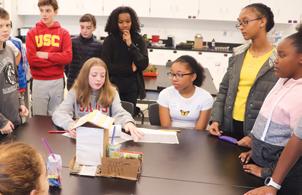
1 minute read
Middle School: 6th Grade Science

ACADEMIC HIGHLIGHT Middle School EXPLORING THE SCIENTIFIC PROCESS
By Emma Glinsmann
6th Grade Science Faculty

In 6th Grade Science, we use a multi-faceted lens to examine the fundamental scientific processes that drive the natural world. We take an interdisciplinary, inquiry-driven approach to examine larger questions about the social and ethical implications of what we learn. Ultimately, we hope that students can thoughtfully answer the following questions: Who cares? Why does it matter? In examining larger questions about the natural world, students assume the following roles:
Lead Engineer: What’s the problem we’re trying to solve?
Number Cruncher: What data do we have to work with?
Social Officer: How will this affect people around us? Students assume these four roles while examining a variety of topics through lab activities, media analysis, engineering design processes, seminar-style discussions, analytical writing, debates, civic action, and field-trip aligned activities. Students leave 6th grade science, understanding what it means to be a steward to their environment.
In each unit, students address an anchoring event with essential questions. Some examples include:
Why is managing Seattle’s rainwater essential to the survival of local salmon populations?
How might rapid urban population growth negatively impact marine ecosystems?
How does good water quality contribute to healthy communities and healthy watersheds?
Why are oyster populations in the Puget Sound declining?
How does changing marine pH affect living organisms?
How might the status of a single species indicate the overall health of an ecosystem?
Why is it essential to understand states of matter and phase changes in order for humans to be able to survive in extreme environments?
How might where you live impact your consumer decisions?
Why might people choose to eat organic foods?
With a year-long curriculum that gives them a foundation in ecology, chemistry, policy, and current local environmental issues, 6th graders end their year with the young reader’s edition of The Omnivore's Dilemma and discussing the ethical implications of the food we eat. All of their practice in role-play, research, data collection, and discussion, comes to a close with a two-day debate that is judged by a panel of guests experts. ☜










